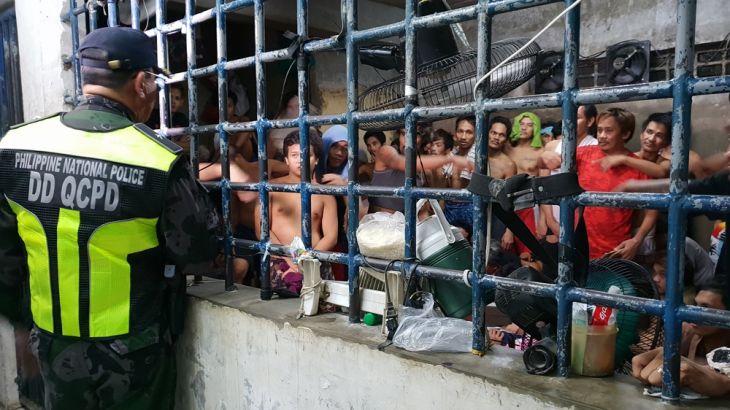Thousands of street loiterers arrested in The Philippines
More than 10,000 ‘idlers’ locked up in crowded police jail cells in order to avoid ‘potential trouble for the public’.

Manila, Philippines – Police have arrested more than 10,000 people for loitering in the streets in the last two weeks, after President Rodrigo Duterte issued a directive to round up “idlers” in order to avoid “potential trouble for the public.”
Most of the arrests have involved men from the metropolis’ most impoverished and densely populated districts, but police have also rounded up women and minors whom they found outdoors during curfew hours.
Keep reading
list of 4 itemsPhilippine human rights campaigner granted bail
Families urge Philippines to work with ICC on ‘drug war’ probe
Philippine police officer jailed for killing teens in ‘drug war’
“What we want to deliver is an atmosphere of safety,” said General Joselito Esquivel, a police chief from Manila’s largest suburban district. “We’re trying to enforce against crimes like [being] half-naked or urinating in public, or drinking in public places such as in the streets.”
Metropolitan Manila had a population of 12.8 million in 2015, with an average of 20,785 people sharing every square kilometre of space.
In slum areas, many people stay outdoors because their shanties are cramped and poorly ventilated. The country’s tropical climate spells sweltering summers and damp monsoons, so men often go about without shirts on their backs, even in public.
These behaviours, often seen in tough neighbourhoods, have come to be associated with street crimes.
![Adults are placed in overcrowded jails while minors sign their names on a list of offenders [JC Gotinga/Al Jazeera]](/wp-content/uploads/2018/06/5d25dee57be54899babd4b829fa87025_18.jpeg)
Traumatised
The police crackdown has seen suspects accosted into police precincts in droves and crammed into already overcrowded jail cells.
At the main police station of the Novaliches district, as many as 50 “tambay” – the local term for loiterer, derived from the English “standby” – are rounded up every night. Adults are placed in jail while minors sign their names on a list of offenders, and wait until an adult relative collects them.
“What worries us is there are cases of abuse,” said Eule Rico Bonganay of the Salinlahi Alliance for Children’s Concerns, “and these are perpetrated by authorities who are supposedly duty-bound to protect the children.”
Philippine law prohibits jailing minors but in the absence of separate detention facilities for them, they usually end up in the same jail cells as adult detainees.
Rights watchdogs have called for an immediate end to the campaign, calling it “anti-poor”.
“The Philippine National Police are conducting a ‘crime prevention’ campaign that essentially jails low-income Filipinos for being in public,” said Human Rights Watch deputy Asia director Phelim Kine.
“This campaign threatens to retraumatize residents of communities already terrorised by ‘drug war’ executions and is risking the detainees’ health and safety,” Kine added.
|
|
“Like dogs in the street”
The case of 25-year-old Genesis Argoncillo, who died while in police detention, has sparked outrage among many Filipinos, and given a face to the campaign against “tambay”.
On June 16, Argoncillo was sitting on a bench in front of a neighbourhood store when police arrested him for not having a shirt on. He was detained with more than 130 other men in a jail cell big enough for only 6 people.
On June 16, Argoncillo’s sister found his body in a morgue, heavily bruised and wounded.
The police first claimed Argoncillo might have died of asphyxiation in the overcrowded cell, and then afterwards presented testimonies from two detainees who said they beat Argoncillo to death during a brawl.
“He was arrested and killed all because he wasn’t wearing a shirt that night,” said Jane Azuelo, Argoncillo’s sister.
She asked, “Was that really a crime?”
![Genesis Argoncillo's death while in police detention sparked outrage among many Filipinos [JC Gotinga/Al Jazeera]](/wp-content/uploads/2018/06/eebe81b923ae44dbab3e6ea0e4d3b46b_18.jpeg)
As public sympathy for Argoncillo poured out, Duterte denied ever ordering the arrests.
“Those sons of bitches were not listening,” he said on June 22. “I never said, ‘arrested.’ But if you are drinking in the alley, in the squatters area and making a living room out of the road there, you’ll really get nabbed.”
He added that he ever said “tambay” was a crime.
Speaking to reporters on Wednesday, Esquivel insisted the campaign did not target mere loiterers. “We go after those who violate ordinances, like being shirtless or drunk or violating curfews,” he said.
The country’s police chief Oscar Albayalde denied misunderstanding the president’s orders, but banned the country’s 190,000 police men and women from using the word “tambay”.
However, for the grieving family, it makes no difference what the victim is called.
Lamenting his son Genesis’ fate, Sergio Argoncillo told Al Jazeera ruefully, “So it is possible for an innocent man who has committed no crime to be picked up and killed, like dogs in the streets.”